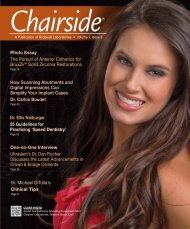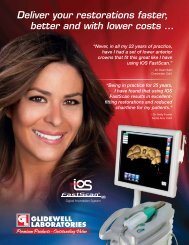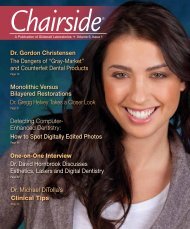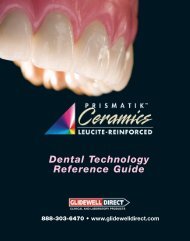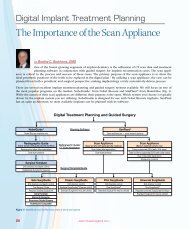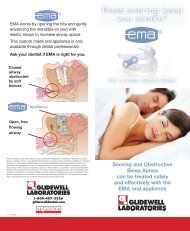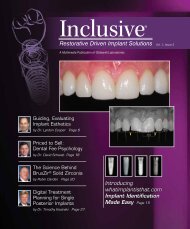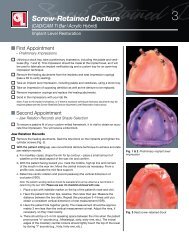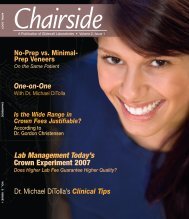One-on-One An Interview with Dr. Paul Homoly Simply Beautiful A ...
One-on-One An Interview with Dr. Paul Homoly Simply Beautiful A ...
One-on-One An Interview with Dr. Paul Homoly Simply Beautiful A ...
You also want an ePaper? Increase the reach of your titles
YUMPU automatically turns print PDFs into web optimized ePapers that Google loves.
PH: Right. After a while it just feels like nagging. Overeducating the patient,<br />
relying too highly <strong>on</strong> patient educati<strong>on</strong> <strong>on</strong> a patient who isn’t ready, feels like<br />
sales pressure. <strong>An</strong>d that’s how you lose them. Last point here about the Crossover<br />
Z<strong>on</strong>e, Mike; let’s start <strong>with</strong> the dentist. The dentist needs to get his own<br />
financial house in order. That means meeting <strong>with</strong> a financial planner who<br />
can get the dem<strong>on</strong>s out of the dentist’s life relative to m<strong>on</strong>ey. If there are back<br />
taxes due, if there is no savings, if there are labs sending cases COD because<br />
you’re three m<strong>on</strong>ths late <strong>on</strong> your lab bill—all of that has a huge depressive<br />
effect <strong>on</strong> the Crossover Z<strong>on</strong>e. Often times, dentists end up treatment planning<br />
patients based <strong>on</strong> their own ability to pay, not <strong>on</strong> the patient’s ability to pay.<br />
My recommendati<strong>on</strong>—and it might be that maybe this is the first recommendati<strong>on</strong><br />
that a dentist should do—is to get a financial services specialist, and<br />
take your own medicine as far as how we treat patients comprehensively. Get<br />
a comprehensive examinati<strong>on</strong> and diagnosis and treatment plan of your own<br />
financial health, and build it into the culture of your family and your team. If<br />
you have team members who are struggling financially, team members who<br />
are involved in financial issues that are toxic to their mental health, it’s not<br />
unthinkable for them to get help also; that can be a huge benefit of working<br />
for you. It could be a huge tool for you to build l<strong>on</strong>g-term loyalty <strong>with</strong> staff.<br />
<strong>An</strong>d maybe you hire a financial planner to come in and to work <strong>with</strong> different<br />
team members as far as getting their credit cards figured out or restructuring<br />
their debt, or <strong>on</strong>e of a hundred things that financial planners can do to ease<br />
some of the dem<strong>on</strong>s flowing related to m<strong>on</strong>ey.<br />
“The myth is, let’s do complete<br />
exams <strong>on</strong> every<strong>on</strong>e<br />
and that way we can showcase<br />
our comprehensiveness<br />
and thoroughness and<br />
how much we care.”<br />
I believe that the c<strong>on</strong>cept of prosperity needs to be a compani<strong>on</strong> cultural ic<strong>on</strong><br />
right next to clinical quality, because prosperity and clinical quality are joined<br />
at the hip, Mike. When a dentist is prosperous and profitable, then that dentist<br />
can afford a good facility, pay great wages, hire great people, afford the finest<br />
materials, get good equipment, use the best laboratories, can afford to take<br />
time off for rejuvenati<strong>on</strong>—and all of that has a dramatic and immediate impact<br />
<strong>on</strong> the clinical quality. The topic of prosperity should not be <strong>on</strong> the fringe, but<br />
it should be at the center of what we do in our c<strong>on</strong>tinuing educati<strong>on</strong> efforts<br />
in dentistry.<br />
MD: Wow, that’s a nice wrap-up right there. <strong>An</strong>d that certainly is again against<br />
the grain, because, it’s as we’ve menti<strong>on</strong>ed before—the dental community is so ingrained<br />
<strong>with</strong> nothing but clinical excellence as the end-all, be-all to a happy career.<br />
<strong>An</strong>d I think you’ve laid out a pretty good case today for why that’s not necessarily<br />
true. <strong>An</strong>d this leads us into a good fee discussi<strong>on</strong> for next time. You’ve suggested<br />
before that while a crown fee of $900, for example, works really well for <strong>on</strong>e, two<br />
or three crowns, it does not work bey<strong>on</strong>d three crowns. I know that’s going to be a<br />
great interview and a great topic for discussi<strong>on</strong>. Thanks again, <strong>Paul</strong>!<br />
PH: It was my pleasure, Mike.<br />
To c<strong>on</strong>tact <strong>Dr</strong>. <strong>Paul</strong> <strong>Homoly</strong> or to purchase his book “Making It Easy for Patients to Say ‘Yes,’” call 800-294-<br />
9370, visit www.paulhomoly.com, or e-mail paul@paulhomoly.com.<br />
CEREC is a registered trademark of Sir<strong>on</strong>a Dental Systems, Inc.<br />
<strong>Interview</strong> <strong>with</strong> <strong>Dr</strong>. <strong>Paul</strong> <strong>Homoly</strong>31



